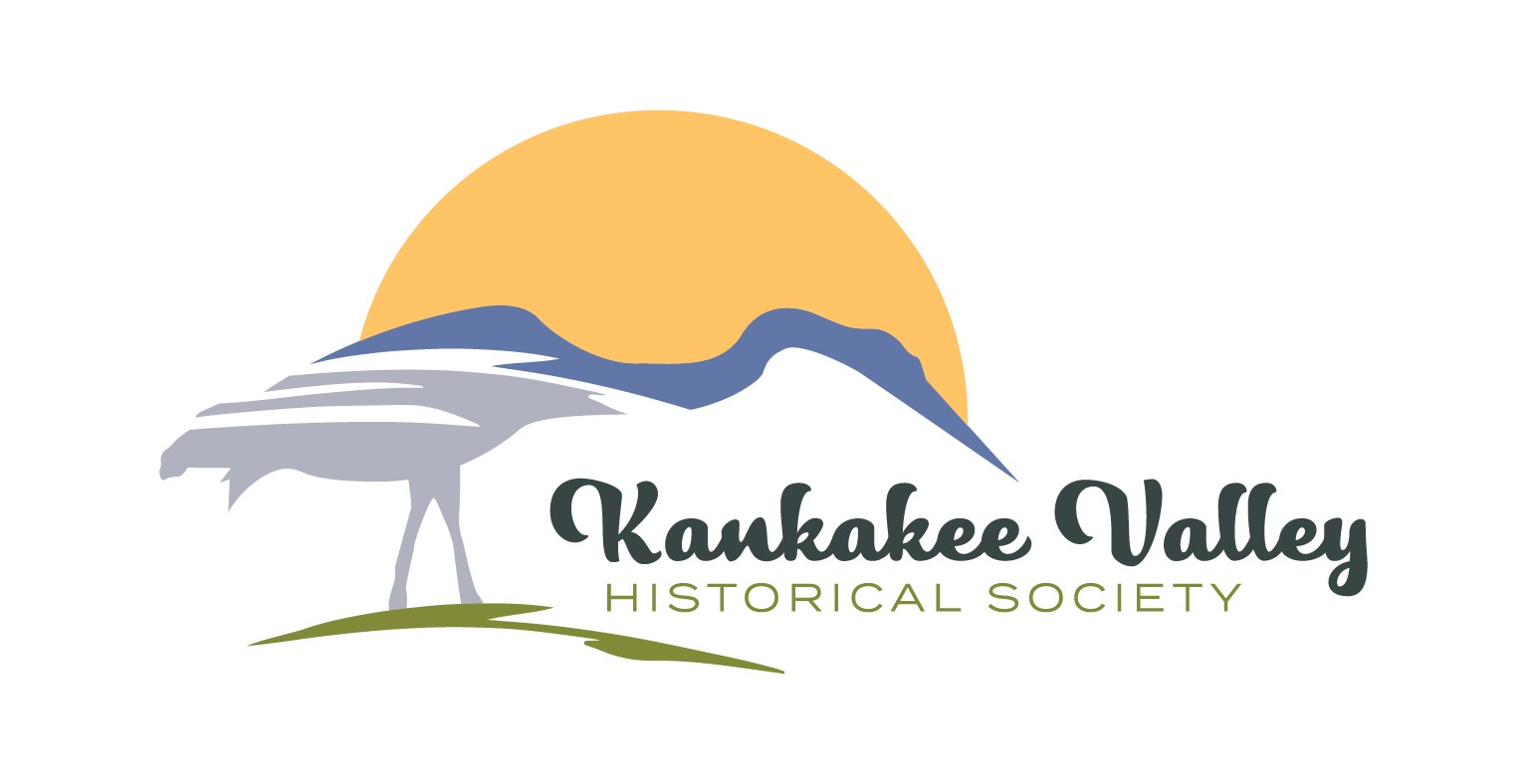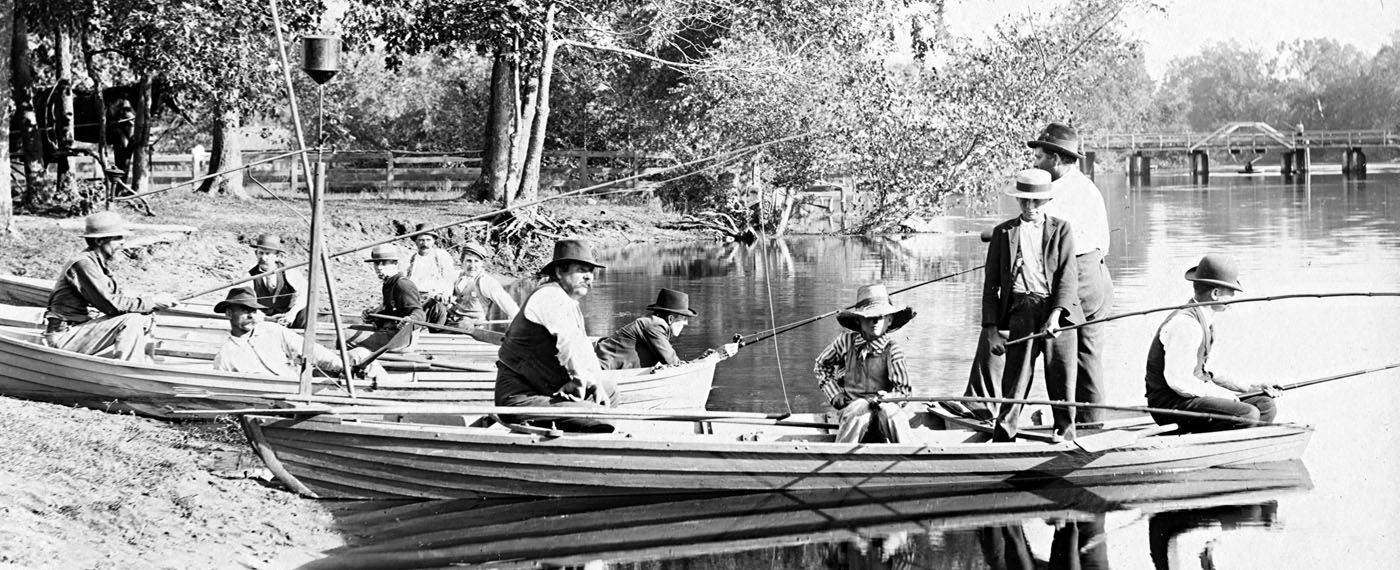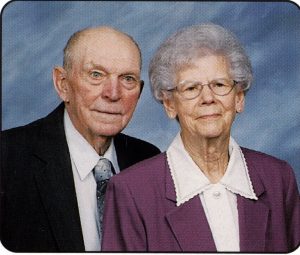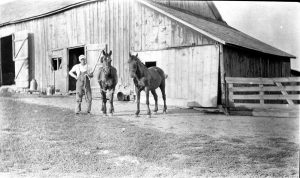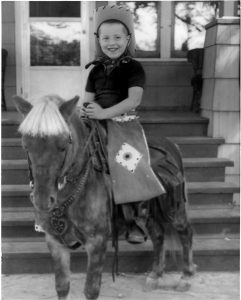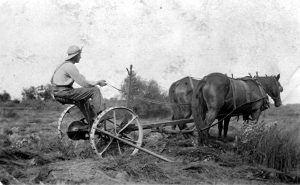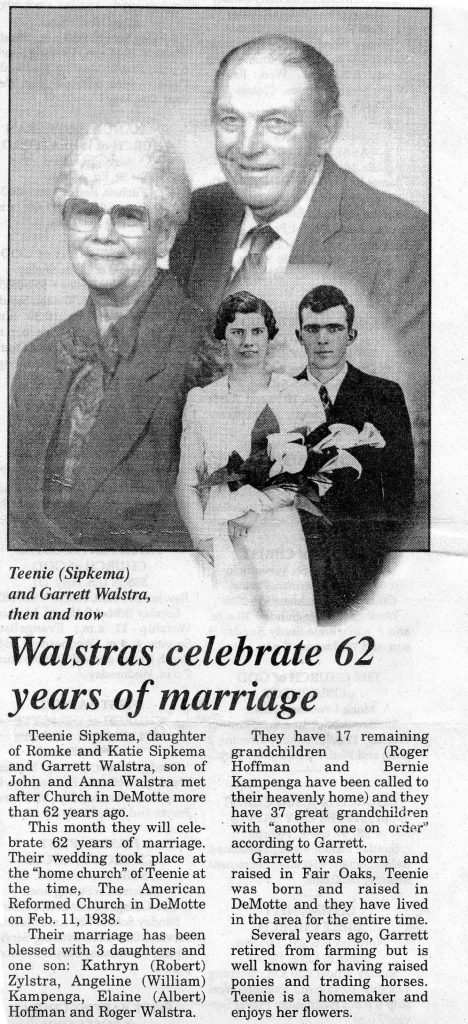The Settling of the Grand Marsh of the Kankakee River
Interview by Laverne Terpstra, Transcribed by Flo Riley
Garrett and Teenie Walstra
February 2, 1996
Garrett was born in 1915 at Fair Oaks, Indiana.
Garrett remembers:
We lived on a dairy farm owned by the Otis Estate. They had about ten thousand acres with maybe four, five or six dairy farmers. The milk was picked up, some taken to Gary and some into Chicago, by train. The average herd of the bigger farms was about forty to fifty milk cows.
We worked all around the circuit (this included several farms) when we filled silo on those acreages. One fellow had a silage cutter and we filled silos on these places. We worked ten days or better at that each year. It was all done manually, you might say, with horses and wagons that carried bundles of corn to the silage cutter and the same when we were threshing. We had wheat and oats and so forth and it was taken in by bundle wagons at that time, threshed right on the yard and blown into haystacks. Also, we blew some of the straw up into the hayloft of the barns and that was used for bedding for the cattle. We used mostly silage to feed the cattle. Horses were the main power of our farming equipment. We put four horses on a gang- plow and plowed about five acres a day. The same with all other crops, binders and other work was done with horses. I think the first tractor I used was the year I got married. We bought a tractor and had one then. I farmed with horses all the beginning of my life.
I lived there until I got married. Then we moved to Kentland for a couple of years and farmed on clay ground. That was a change from the sandy soil I was raised on. After that we moved back to Fair Oaks and dairy farmed there for four or five years.
Later we bought about two hundred acres north of DeMotte in the river bottom at 15771 N Highway 231. That was in 1944. We made some improvements such as we bulldozed some of the trees to clear about thirty acres to make more farm ground. We raised pickles and cucumbers on it and had Mexicans come out to pick the cucumbers. We cleaned up some more ground and had more farming land. We let the bulldozed ground lay for awhile until the trees rotted, then ‘dozed them off and planted corn and beans. We had some very good crops after that.
We lived on bottom land a good fifty years. We cleared a lot of land. Later on we purchased some more ground when my folks passed away. They lived on a farm also and we split up that ground. It’s been very good to us. Some people think it’s too wet. Now we have pumps installed that pump water either on or off the land, as needed. Land value has come up quite a bit. In planting and harvesting the farmer needs more security in their work and now water is pumped on the land whenever it’s needed. The water comes out of the river and goes into the Hodge Ditch and seepage is great. That’s how the corn and beans or whatever is planted is given water. It seeps back into the sandy type soil.
The land could get real wet at times. Maybe it sounds impossible, but there was a time when the water flowed over Highway 231 just a little ways south of our house. That time we had water in the basement. But that was the biggest flood we had in that bottom land as long as we lived there. We were fortunate. We had water there yes, but we’d pump it off with a twenty-four inch pump that pumped twenty thousand gallons of water a minute and that cleared up a lot of water off the whole section there. Other owners, my brother and others, owned land in that section of seven hundred fifty acres. We have been very successful there, which we appreciate. The Lord has been with us every which way we turned.
We retired in 1977. In 1982 we moved to DeMotte. Now I rent the ground out to a farmer. He raises a lot of seed corn out there. Back years ago we raised seed corn with all the detasseling done by hand. Now, it’s done with a lot of machines that cut the tassels off and it’s quite a change from physical labor to mechanical labor, you might say. The same way with farming. The tractors at that time were just common ordinary tractors but now it’s all push button and the same way with the combines and so on and so forth.
In 1950 I started raising ponies, a lot of just shetland [ponies. I raised colts and sold them. Some years I raising thirty colts a year. To sell those colts sound a little odd, but I would put a price on them, the little filly colts four months old were selling for $300.00, the little geldings brought $150.00. I didn’t have to feed too much because at that time we didn’t work the cornstalks over until spring and they fed in the cornstalks all the time. After that, the price of ponies dropped, I quit raising them. I started in on the riding horses and I’ve dealt in them for twenty years or better now. I have other hobbies also. I ride horseback a lot, sell and trade, but since I’ve gotten older I quit it somewhat. I’ve had other hobbies in the past. I’ve done some fishing, going pretty well all over Canada in some areas and also I’ve been to Missouri fishing, which I enjoyed every minute of my time there. I’ve also had hunting hobbies, have had coon dogs all my life and still enjoy hunting although I’m getting older and the trees are getting too tall for me to see the coons in the top.
Teenie was born in 1914.
Teenie remembers:
I lived on a farm all my life. In those days farming was not what it is today. As Garrett said, it was done with horses and very small acreage that they would take care of at a time. When I was a teenager, after I got out of school, I worked for grocer, Bill Swart, in DeMotte for $1.50 a day. That sounds like a very little bit today but at that same time we had all the necessities that we needed. We did not have all the pluses that we have today but we did have enough to eat. We all had good homes to live in without the modern facilities but we were always kept busy. In the summertime we would work in the fields. We would have some pickles. It would get terribly, terribly hot but we picked the pickles and sold them to earn enough to get some clothes to go back to school for another year.
We all enjoyed each other. For our entertainment, we had a porch to sit on in the evening and would listen to mainly country music on the radio. We would go to bed early because we all had to get up early in the morning to start a new day. I often think of the traffic we have today. Back then we lived about three miles out of DeMotte where it seemed like at about eight thirty or nine o’clock in the evening everything stopped because there was no place to go to work. All the work places closed earlier in the day. People just kind of stayed home because there was nowhere to go and no money for gas to ride around very much.
We went to church on Sunday and had what we called Catechism on Thursday nights and that was the only two things we went out to, regardless how old we got, until we got married. There was always something to keep us busy. In the evenings we would play games around the table. It was a slower living pace at the time, but we did have our good times.
My parents were born in Friesland, Holland. They both came across and settled in this country and made a living. They had some very hard times. My Dad lost a wife and he had children. My mother and her husband came across. She was only here about a year when she lost a husband because he had pneumonia. The doctor asked him to come back to Roselawn for more treatment. He went in an open buggy and instead of getting well, by the time he reached home he was very sick, got pneumonia and passed away. My mother was married again. Her second husband died when she was only in her thirties. Then she married for the third time and through all of this times were very hard. She had a rough time sometimes making a go of it all.
My mother was coming across at the time the Titanic went down. The Titanic had just been built and they said it was indestructible, that no damage could be done to it. She did not come on the Titanic because it was very expensive to sail on that ship, so she took an ordinary ship. One evening, she said, it got terribly cold and they were on the deck. They were asked to go inside because it was too cold to be out. She did not realize it until the next morning that they had been sailing very fast the night of the Titanic tragedy. The next morning they were given the news that there had been a gigantic iceberg in the way so the Captain turned the ship around and sailed back the way they had come as fast as they could. Not long afterward they turned back and headed back toward America. The next morning they were given the news that the Titanic had run into the iceberg and sank.
Garrett talked about the days when there was a silo filling and threshing. The gangs would go around with the men doing the job at hand, but the ladies were in the house, a couple or three ladies, making meals for these men because there would be quite a crew off men. In those days they made a complete meal which was very delicious. Pie and coffee were always served with the meal. Besides that they took two lunches to the men, a coffee time in the morning and another in the afternoon.
The ladies were kept very busy baking and cooking, making these big meals. We did have a summer kitchen and that was where we did a lot of this heavy cooking for the gangs we had come over at that time.
When we washed clothing we put a wash boiler on the stove, pumped all the water, carried it in, then heated it and put it in the washing machine. The washing machine had to be cranked back and forth and that did the washing. Wash day was an all day affair. Then all the clothes we had, had to be ironed so we’d have to heat our irons on the stove. We did a lot of ironing in those days because of the kind of material they were made of. We did a lot of canning. We had vegetables of all sorts. We put them in jars with water and salt, then the jars were put into the wash boiler to be boiled for a couple of hours. We did the same with meat. The men would do the butchering and after a few days of hanging outside in the cold, they would bring the meat in. We’d cut it all up, put it in jars with a little salt and water, seal it and boil those in a big boiler. That provided a lot of the food we’d use in the wintertime. When they butchered a hog there would be the lard which was cut up, put in pots and heated up. The fat would melt and leave just the cracklings. This process was called ‘rendering’. The cracklings were not allowed to go to waste but were used to put on bread. We didn’t have all the food we have today, but we were satisfied with what we had at the time.
We were married in 1938 in one of the very first church weddings in this area. There were very few church weddings at the time because most couples were married in the home. Now we have a big family. We have four children and now we have nineteen grandchildren and twenty-nine great-grandchildren. We did have a tragedy strike in the family. We lost a grandson who was eighteen years old at the time. He was killed in a car accident but we have the assurance that he is now in heaven with Jesus. And we’re very happy to know that the girl who was in the car with him did not get hurt very badly.
This concludes the interview with Garrett and Teenie Walstra.
